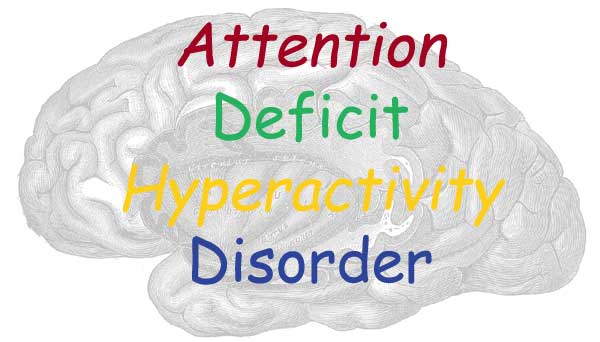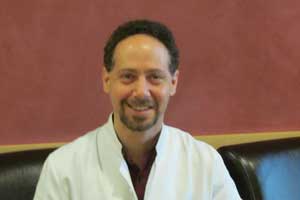ADD / ADHD Care -An Interview With Dr Bier
One of our areas of focus within HNNH is working with children with ADHD, and other mood or behavioral issues. As Medical Director of the Dietary Research Foundation, a research organization dedicated to advancing the knowledge of the interaction between human nutrition, cognition, behavior, and intelligence, Dr. Bier has spent over 15 years researching and publishing on the interaction between nutrition and cognition, behavior, and intelligence, and has a special interest in working with children with behavioral and learning issues.

We sat down with Dr. Bier to talk about his background in the area, and philosophy of treatment.
What began you interest in working with patients with ADHD?
I have always been interested in working with children because my experience, my belief, my true hope is that if we help kids be healthy they never have to experience themselves as someone who isn't healthy and they do not have to become a teenager or adult who is unhealthy. If you get them young enough, they do not even remember a time in their lives when they weren't healthy, which allows them to experience themselves as whole, healthy beings. My ultimate goal is to treat a child at preconception so that the pregnancy is healthy, better yet to treat the parents so that the child is born healthy. A happy, healthy child is really the best way to make the world a better place.
What research encouraged you to help children working with ADD, ADHD and mood disorders?
When I was director of research at Southwest College of Naturopathic Medicine and Health Sciences, I began to do research with a professor at California State University, Dr. Stephen Schoenthaler, in the areas of nutrition and cognition, behavior and intelligence. Our work was able to show that sometimes, minor nutritional interventions can have huge impacts on children's cognition, their ability to think and do well in school as well as their behavior, even showing improvements in intelligence scores on standardized tests. So if you can make substantial changes with minor modifications, when we are looking at the whole person and optimizing their health, the possibilities are tremendous. We can help the child experience themselves as the best they are able to be.
What part does the research you did play into your practice and approach now with ADHD patients?
Our research delved into what factors contribute to ADD, to difficulties with cognition and intelligence. What we found is that for people who are deficient in any of thirteen essential nutrients and have behavior or cognition problems, repleting those deficiencies will correct the brain function, and thereby allow them to improve their academic performance and behavior. The changes were even measurable in brain waves.
It’s actually incredibly simple to take deficiency to sufficiency. We did blinded controlled studies in schools in Arizona and saw incredible results with a two penny a day chewable multivitamin; based on standardized tests the kids who took the multivitamin experienced four months of education compared to the kids who did not get the multivitamin who got two months of education in the same classroom with the same teacher. Essentially, we saw that if you give those vitamins and change the food, it was enough to almost double learning in a classroom.
Quite honestly, almost any basic (although we design something special) multi vitamin is going to give a decent amount of those thirteen essential nutrients. In our studies there was a measurable three point gain in intelligence in IQ tests in schools with kids from both good socioeconomic status and those from low socioeconomic status who were were deficient,, so moving kids who are deficient to sufficiency is really very simple.
In the work that we do clinically with children, we work to go deeper and help kids maximize their health and their cognitive function, as well as their mood, an issue which has become so much more common than it was twenty years ago. When I started practicing you didn't have as many kids with mood disorders, or depression, or with anxiety. Quite frankly, you didn’t have as many people, children, teens or adults; the reality is that ADD and behavior or mood disorders is far more prevalent across all age group these days. This collection of issue is when it becomes much more difficult and I cannot just say "here, take this multi-vitamin". Why are we seeing more of these mood disorders? How is that related to the cognitive ability of the child or the person? These are the larger questions and where treating each person as a unique individual becomes absolutely necessary.
Do you think part of that stems from the imbalance within parents before they conceive and it moves on to the child, as it seems as though each generation is more nutritionally misguided than the previous generation?
It is actually an incredibly scary area of research called epigenetics, which is the study of how genetic change is passed down through the genome across generations, that is something that we didn't realize at all ten or twenty years ago. we used to think that, no matter what you did to yourself, you could pass on clean genetics to your children. In fact, that is not the case; it has been shown that what you do alters aspects of the genome that is passed down to your children and they basically suffer for the sins of the parents. So what we are seeing in children I think is, without question, related to what we did to our bodies through improper diet and environmental chemical exposures, as we were affected by what our parents did that passed down to us.
What is your approach to working with ADD, ADHD or a mood disorder?
As always, when I am working with any patient, we are looking at trying to address the root causes. What is actually causing the difficulty in this particular, unique person? Our primary tools are always to look at the diet too see if it’s supplying the correct nutrients and to make sure none of the foods are reactive to the person., to use supplements as a tool to replenish and rebuild weakened systems, and then use treatments for the neurological system as necessary.
The first thing we look at is what is this child or person eating? Are they eating foods they are reacting to? Are they eating foods that are actually causing the problem? Finally, are they missing foods that would give them nutrition so that the brain can function properly?
Our approach is taking out foods that are causing a problem and adding in things that can help. Diet is the core of this approach, then we look at supplements. We use supplements to replenish what is missing in the person- either because it hasn't been in their diet or because some of these epigenetic changes we were talking about. That person may require a higher level of supplementation, which may be required indefinitely. Repleting the nutrients that are missing, then adding in the things that are necessary to strengthen, to shore up the brain and support weakened areas. We have a whole line of powders and chewable supplements I have created especially for children, who might not be able or willing to swallow capsules. These supplements are tasty, fun, and help supply the necessary nutrients without using anything artificial that is negative for the body.
Finally, we look at treatments. We have a number of treatments such as CranioSacral therapy that can be very helpful for children in terms of stabilizing the nervous system, helping them come to a calmer space and staying there in that calmer space. So when you use those three effective tools (diet, supplements and therapies) you tend to see children perform much better in school. Teachers will frequently, if not consistently, comment on how much better the kids are doing. , This approach really frees the child up to not just do well in school, but to also be who they truly are, when they do not need to be using so much of their energy to try and hold themselves calm when they really aren't, to try to hold anxiety or mood disorders at bay; they can just be kids again!
Do you work with families who do not want to put their children on pharmaceuticals for their diagnosis only, or families whose goal it is to have their child get off the medications they are on?
We see both of these types of families. The goal is always to have them experience themselves more truly as who they really are and that is definitely possible to do without the medications over time.
I do not prescribe the medications, however, many of the children are on medications and that is fine. When they no longer need it as much, we are able to reduce the dosages, or we are able to take breaks over school breaks or over the summer, and then we often find they never need it again.
How quickly can results be seen after families meet with you and start incorporating your suggestions?
Changes in behavior and focus can happen incredibly quickly, within days sometimes. Again, you have this balance between things they are doing that are wrong for their body and then things they are adding in to strengthen and stabilize their bodies. So, if that is fifty/fifty, when you remove those bad things, you see a fifty percent improvement, if it is ten percent/ ninety percent, then you see a ten percent improvement and the other ninety percent is going to be slower. You can see a significant improvement very rapidly. The key is that the neurological tissue is very slow to change tissue. Skin is turned over all the time; every red blood cell that exists in your body today will be gone in three-four months, so, in four months we can have new blood cells built with all the new nutrients. Your brain cells don't turn them over - they are with you for life. , So, brain cells that were built with the wrong fats don't just go away in three months, they have to be actively repaired by the body. That is a years-long process. We are looking forward to a point will they have the resiliency that I want them to where they don't need to be taking the herbs, where if the environment shifts they can handle it the way I would want them to, but that is a years long process. They can very rapidly have great improvements with the correct support. It is not yet truly resiliency and strength in the body yet, that, unfortunately with the neurological system, will take years to develop.
Why do you put so much focus on ADD, ADHD and mood disorders in children?
There is nothing more gratifying than seeing a person, a child, who was so defined by a negative, so defined by a diagnosis and a disability to function, come into their own and leave that behind. This child is able to manifest who they are and what they are truly capable of, and know that they are going to be able to go out into the world and do what they should be doing because they are able to function without this incredible drag on them, this disability. That s why we put so much effort into this, because the reward of seeing even one child who might not have been able to actualize themselves become who they truly are is unbelievable.
This is true of our patients from age five through college age; we are seeing a surge in college age students diagnosed with ADD or ADHD. Traditionally when we hear that term we tend to think children, but those children have grown up, and it now affects adults and those 20-somethings in college; you see people struggling to make it through instead of truly learning and getting the support they need. Their nutritional deficits mean they are not able to think as clearly as they should, and are not getting the experience they should be getting. So to answer the question of who do we treat for ADD/ADHD is - anybody who has difficulty with focus and mood and getting the support to actualize who they are and what they want to be doing.
Is it worth forcing a child or in any way impacting a child's ability to eat and be "normal?" Why not let them just eat what they want to eat, do what they want to do and have them take the medication?
There are a lot of answers to those questions. First of all, the medications don't work that well and do not solve the whole problem, plus they have side effects; if the patient’s food hasn't changed, you are adding and creating a lot of negative reactions within the body. No child or person likes to be different, especially younger people, especially teenagerst. We work very carefully with each family to see what is possible for them, what they are willing to do, and we individualize our protocols on that to make it sustainable and easier for the patient and the family to succeed.
This is an investment in the future so these children fully experience their childhood; because the fact is they already aren't. They are not experiencing themselves as the calm, centered individual they have the potential to be and, like anything else you want, like getting good grades in school, you need to put the work in, it doesn't just come. It is much easier to start making these changes earlier the earlier you begin, the more the person considers it normal for them.
As I often say, my favorite time to start is preconception and then we do not tend to have these issues. So, the younger they are, the easier it is to make these shifts in the diet, which becomes ‘this is how we live in the world and this is how we eat’. It is not about being perfect, this is not about never making a mistake, it is about educating the person about what works in their body. What happens when they adhere , usually pretty quickly is that they feel better, they like how they feel inside and how they act better. So when they go off, when they put back in the things that are causing the problems in the body, they don't get the good feedback they were getting from teachers and friends. Most importantly, they do not particularly like the way they act, so it becomes a really positive, self sustaining input. If they were hesitant in the beginning, and then they start to get the feedback, both internally and externally, that strengthens and reinforces that good-for-them eating behavior.
Is there a way that you would advise families to prepare for this lifestyle change to avoid some of the resistance to the coming changes?
My experience is that most children who have these issues are very well aware of them. Even though it is so common today it is still a stigma. So even if the child pretends that it isn't, dealing with their lack of ability to control themselves, to be and act calm, is really still very difficult for them emotionally. Being able to offer them a potential solution is usually received as a very positive thing. In our practice, we have developed the tools to make this a very sustainable program while they are in school. Fortunately, there is so much acceptance today of alternative diets; unlike fifteen years ago when they would have been the only child in the school bringing food from home and eating differently. Today, it is so common to not be able to bring peanuts to school, as an example, because so many are allergic or gluten sensitive. I think it is much more common and accepted that you can have your own individual diet, it’s even trendy!
If you had a message to get out to people with these diagnoses, what would it be?
I would say that these diagnoses - ADD or ADHD, neurological dysregulation, disharmony, or dysfunction as a whole has unfortunately become incredibly normal in our population and people may take it for granted that it is a variation of normal, but it does not have to be that way.
We all have a unique individuality in terms of how we process and look at the world and that is wonderful. There will always be variations among people in that, there is no one perfect way everybody should process. However what we are seeing today is not just the recognition of a wider variation of normal, but an acceptance of pathology that has been passed down through epigenetics and the generations. The nervous system function has been changed through exposure to the chemicals and through the alterations in our environment.. Having to live with those changes is not normal, and it is also not necessary. We can make shifts and changes so that the child's energy can go towards creative expression and not towards trying to get their neurological system and their thinking to function for them. With the incredible amounts of demands that today's world and their schooling environment puts on them, we can help them function at their best capacities, instead of constantly compensating.







